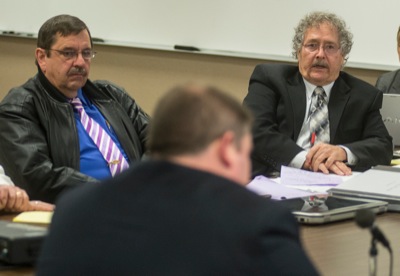Thursday, February 13th, 2014
Slusser claims his firing was based on old ill will
By William Kincaid

Photo by Mark Pummell/The Daily Standard
Former Celina police chief Dave Slusser, left, and his attorney Greg Wilson, pre-sent their argument of why Slusser should be reinstated to Scott Claussen, an attorney appointed by the local civil service commission to conduct the public hearing, which concluded Wednesday.
CELINA - Former police chief Dave Slusser believes Celina Mayor Jeff Hazel was harboring ill feelings against him for some time.
During the second day of a public hearing to determine whether the ex-chief should get his job back, Slusser, who was fired by safety service director Tom Hitchcock on June 14 for alleged misconduct in office, testified to a computer incident in which city files were accessed.
Slusser claims the city in 2009 attempted to create an intercity network of computers to improve communications. He said one day he notified Hazel, then serving as city safety service director, that a police laptop contained icons that when clicked accessed personnel information from multiple city departments.
In June 2009, Slusser said he met with then mayor Sharon LaRue to discuss the computer incident, including the issue of illegal entry of a computer file. Hazel was on hand too, he said.
Slusser said he told LaRue that he had reported the computer problem to Hazel three to four months before Hazel actually came to look at the police laptop.
Slusser said he was excused from the discussion.
"And Mr. Hazel was no longer an employee of the city," Slusser said.
Slusser's attorney, Greg Wilson, submitted previously administered depositions of Hazel and Hitchcock on Wednesday instead of having them testify in front of Scott Claussen, an attorney appointed by the local civil service commission to conduct the hearing.
In his deposition, Hazel said LaRue on June 5, 2009, asked him to resign, which he did. Hazel indicated he didn't know why the mayor asked him to resign and said it wasn't over the computer breech issue.
"And then Jeff Hazel ran as a Republican against a city Republican mayor, Sharon LaRue, correct?" Wilson asked.
"Yes," Slusser replied.
"Prior to that, he didn't have the authority to fire you but that he got the authority to fire you when he took office as mayor?" Wilson asked.
Slusser said that is his understanding of the state law.
Pete Nevada, an attorney with Clemans-Nelson & Associates, which is representing the city, cross examined Slusser Wednesday afternoon.
"Were you saying that Jeff Hazel somehow resurrected an incident from several years ago to retaliate against you in this investigation?" Nevada asked.
"Did I believe that Mr. Hazel has long-term ill-feelings with me because we don't get along on some issues ... yes, sir, I do," Slusser said.
"And you admit that the investigation here was carried out by the safety service director and not directly by the mayor?" Nevada asked.
"I believe the mayor and the safety service director work hand-in-hand," Slusser said, adding the safety service director is there to do the mayor's bidding.
"You're a police officer, or were a police officer, you've done a lot of investigations ... what evidence do you have that connects Jeff Hazel to your disciplinary action other than your interpretation of an off-hand comment made by the safety service director?" Nevada asked.
"My interpretation is what I have," Slusser said.
"That's it?" Nevada asked.
"Yes," Slusser said.
Nevada further questioned Slusser about the charges that led to his termination, including not documenting receipt of/and mishandling a bottle of prescription Xanax pills linked to a domestic violence case; altering employee time records so restricted alcohol and drug funds could be used to meet a police payroll deficit; failing to return a .380 pistol to its manufacturer after testing it; not disposing of blood-stained evidence - clothing, blades and edged weapons - according to departmental policy; and not following a direct order to wipe clean data on two laptop computers, which allegedly contained photos from a child abuse investigation.
Slusser admitted to some of the underlying facts he's accused of but denied all the formal charges.
"There are specific issues of conduct and activities within some of those charges, that yes, (I agreed to)," Slusser said.
He acknowledged he's been forgetful his entire life but said at work he tried to document his activity so forgetfulness wouldn't be a problem.
Nevada said Slusser had in his possession public documents - specifically, the radio log of Dec. 28, 2012, which Slusser claimed reminded him that he disposed of the Xanax bottle at a Mercer County Sheriff's Office drug-drop event - throughout the summer of 2013 and during his deposition in September.
"And yet you waited until December (2013) in an affidavit to make any mention of that ... you didn't make any mention prior to the December affidavit?" Nevada asked.
Slusser said he didn't have much of an opportunity to make mention and no one was asking him any questions about the firing.
"You talked about having a meeting with Mr. Hazel and then Mayor LaRue ... doesn't that suggest that you knew enough about computers not to screw up sanitizing a couple of laptops?" Nevada asked.
"I thought I did know enough about computers not to screw up sanitizing a couple of laptops," Slusser replied.
Slusser said he moved police files from the laptops in question to a flash drive to store on another computer.
The files included information from inactive, years-old cases, Slusser said.
"Why were you more careful about that information than you were about the pills or the blood-evidence?" Nevada asked.
Slusser said the blood-stained materials were no longer evidence in a case.
Earlier in the day, Mercer County Sheriff Jeff Grey testified that on either Monday or Tuesday of the week Slusser was put on suspension - Feb. 14 - city law director George Moore and city safety service Tom Hitchcock, both on speaker phone, called Grey to ask if the department would investigate Slusser.
Moore indicated that the nature of the investigation was administrative, not criminal, Grey said.
Grey declined to do the investigation because it wasn't criminal and referred them to a BCI agent, who Grey said was contacted by the city. The agent thought the nature of the allegations was administrative, not criminal, Grey said.
"Neither agency wanted to get involved in an administrate investigation," Grey said, adding that if criminal charges did turn up, either BCI or the sheriff's department would investigation. Wilson asked Grey, who worked under Slusser, then supervisor, at the Celina Police Department from 1984 to 1987, his thoughts on Slusser's law enforcement skills.
"I always tell people that Dave is probably one of the best street-smart cops in the county," Grey said.
Grey said Slusser and he have differing management viewpoints from time to time, but they generally can work through that. He pointed out that Slusser called him to ask if he needed help with the Grube homicide in Fort Recovery, even it means getting hamburgers to Grey's guys.
On cross-examination, Nevada asked Grey if he reviewed all of the facts of the Slusser case, which Grey said no.
Attorney Lou Schiavone, who represented Slusser twice during two disciplinary-based issues before city officials, testified that he accompanied Slusser to what he thought was a pre-disciplinary hearing on March 21.
Schiavone learned the meeting was part of the continuing investigation, not a pre-disciplinary meeting, but said Pat Hire of Clemans-Nelson & Associates, the city's representation, allowed him to stay.
"(Hire) told me in no uncertain terms, 'Dave won't be coming back. He will either have to resign or be terminated based on what we already know and what other things we're looking into," Schiavone said.
Schiavone said he was taken back by the comment because of the assertiveness and definitiveness of what Hire had to say.
After the meeting, Schiavone said Hire asked to speak with him alone. Hire, according to Schiavone, spoke about a litany of complaints and allegations, including that Slusser's staff didn't like or trust the chief, that Slusser won't be coming back and prosecutors don't want to work with Slusser.
The public hearing was concluded on Wednesday afternoon.
Both sides have until April 16 to submit closing arguments by brief to Claussen. The two sides have until April 28 to respond to one another's briefs.
Claussen will rule on the case some time after that.
The civil service commission comprised of Matt Gilmore, Denny Smith and Janet Smith will either accept, reject or modify Claussen's ruling. That decision will then be subject to appeal.






